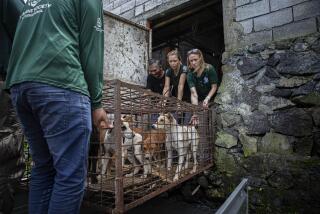Illegal Boar Meat Is Popular in Sri Lanka
- Share via
COLOMBO, Sri Lanka — It doesn’t take much more than a nod of the head to be served a sumptuous meal of rice and wild boar curry at a roadside food stall -- even if it has been illegal for four decades.
Boar connoisseurs settle in at makeshift diners all across the island’s forest areas for meals of meat that they say has a venison-like taste and is as lean as chicken.
A 1964 conservation law bars the sale of any boar meat, even boars killed legally under an exception for animals that invade farm fields. Yet boar carcasses have a way of making their way clandestinely to restaurants, and those who love boar stew, meatballs and barbecue are debating whether to campaign for the government to scrap the ban and make their meals legal.
Some would even like to see wild boar meat made available in supermarkets, as it is in Britain, the former colonial ruler.
It would be a big step. While many Sri Lankans eat meat -- beef, lamb, goat and pork are legal -- people are reluctant to come out publicly for the killing of wild animals in a country where the majority practices Buddhism, a religion that preaches the oneness of all living beings.
Still, proponents argue that ending the ban would bring some order to the now illegal and unregulated trade. They also say the 1964 ban has led to an explosion in the numbers of sometimes ferocious boars, which root about with their long, curved tusks.
Although no census has been conducted, boars are frequently seen outside wild areas, and some experts estimate that the boar population has grown to several hundred thousand. Each female can rear 18 to 22 babies a year, animals that can grow to 130 pounds.
S.K. Abahayasingha, a professional tea taster in the capital, Colombo, suggests that the government give licenses to reputable companies to manage the boars.
“They can export some, keep some for those who want it here and rear the others in the jungle,” he said. “This way all will be happy.”
Dayananda Kariyawasam, chief of the Department of Wildlife Conservation, is doubtful that things will change on the island, just off the southern coast of India.
“I don’t think this is possible,” Kariyawasam said. “I agree that we do have a problem of having too many wild boars, but to suggest that we start trading in wild boar may not be acceptable.”
The 1964 Fauna and Flora Protection Ordinance banned the sale or transport of wild boar meat, even that of boars killed under the exemption for animals that damage crops. Offenders can be fined about $100.
But restaurant owners make a good enough profit on clandestine boar dinners to make the risk worthwhile.
“We do arrest people violating this law,” said Alfred Wijewardene, director of the police crime department. But he said no centralized statistics are kept because it is a “low-priority area of work.” He said that in most cases, the offender pays the fine.
Traders in boar meat employ hunters who kill the animals, saying they had invaded farmlands. Then the meat is transported secretly to restaurants. Under the law, a hunter cannot be punished, only the transporter and restaurant owner.
People looking for boar meat can also find it at small roadside shops that normally sell coconut or corn.
Cars pull up and the buyer asks for “dadamas,” which means “bush meat” in the Sinhala language. Then neatly packed parcels of 2 1/4 to 4 1/2 pounds change hands, for the equivalent of about $1.15 a pound.
Aside from the ban on trading in boar meat, the animals’ population got another boost in 1971 when the government banned firearms and confiscated them from villagers during a communist uprising in which more than 10,000 people were killed. That has been followed by a two-decade-old guerrilla war by ethnic Tamil guerrillas that has killed six times as many people.
The ban on guns has made it harder for farmers and villagers to kill rampaging boars. They use clubs or gather large crowds to frighten the animals away.
With their numbers growing in the forests, some boar herds are beginning to venture into urban areas.
Wild boars invaded the provincial legislature in Kandy in central Sri Lanka last year, damaging expensive carpets and furniture before guards chased them away with clubs.
At a hotel near the Yala National Park, boars wander close to the rooms looking for food.
“We tell our guests not to feed them at all,” said Viraj Karunaratne, a manager. “But they hang around in dozens in hope of getting something.” He said no guest had been attacked.
More to Read
Sign up for Essential California
The most important California stories and recommendations in your inbox every morning.
You may occasionally receive promotional content from the Los Angeles Times.











